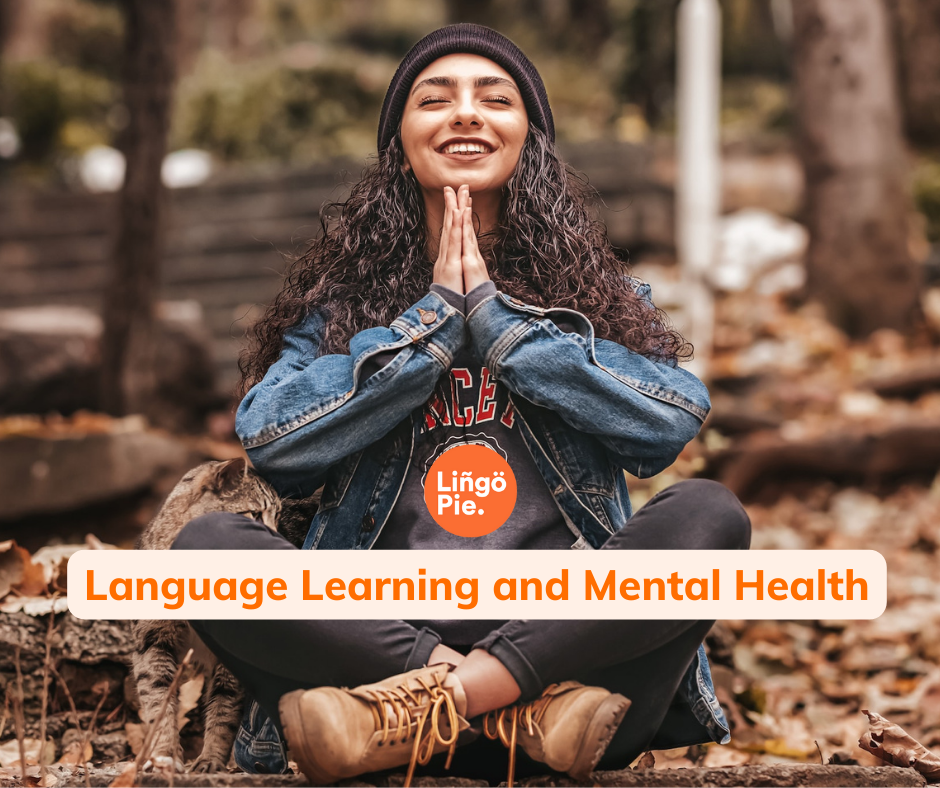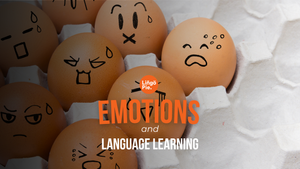Learning a language is usually a very practical thing. We’re encouraged to study in school for good academic standing, or we holiday abroad and quickly learn that it’s sensible to pick up a few phrases in the local language for ease and efficiency whilst traveling. Or these days, it’s common for children to grow up natively bi-lingual due to having parents from different countries.
But have you considered how beneficial learning a language is for your mental health? In a world where logic and practicality are considered to be the most valuable assets to our thinking, it’s vital to remember how important it is to do things for ourselves - for fun, for love and for personal growth.
Outside of all the functional, useful reasons, learning a language is a significant way that you can stimulate your mind, reduce your stress levels and practice focus for mental balance and self-management, whilst creating the opportunity to open new connections, new friendships, and new life paths. All of which can better your quality of life.

Millennial Mental Health and Language Learning
Millennials - born between 1981 and 1996 - are reported to have the fastest-growing decline in mental health and in recent years, have been declared the most anxious generation in history. This could be for many factors including financial stress, political events, and an unhealthy work-life balance, all of which cause psychological distress and anxious thinking.
The consequence of this is loneliness and conflict in relationships with friends, family and self, often leading to anxiety and depression. According to a poll by YouGov, 30% of millennials stated that they often feel alone, with an average of 1 in 5 millennials expressing that they have no close friends. And it’s certain that the Covid lockdown didn’t help.

However, what the pandemic did give was time, space and opportunity for millennials to stay home and start learning a new language. Duolingo's ‘Year in Language’ Report explained that 30 million people began learning a new language during 2020 in order to feel connected. In a survey conducted by Lingoda, they claimed that Millennials made up 53% of participants and viewed learning a language as a way to feel more confident in communication and to improve their lives.
But how exactly can learning a new language improve your mental well-being? From scientific biological facts to spiritual and emotional reasoning, here’s a break down of how and why learning a language will improve your quality of life:
1) Stress Reduction and an Antidote to Mental-Health Illnesses
Language learning alleviates symptoms of depression.
Learning a language can help alleviate symptoms of depression by very practically giving you something to do to distract you from your thoughts, whilst subconsciously providing you with a sense of achievement, purpose and belonging. This is because learning a new language opens opportunities for connecting with new people, new cultures and new places, therefore inspiring feelings of hope, love and liberation as you begin to find fresh ways to view the world and enrich your life.
In a depressive mindset where you feel small and lonely, learning a language helps you broaden your horizons because each language is full of new vocabulary and perspectives that can help you shift the way you think about yourself when you learn and adopt new ways to express yourself. For example, in French, ‘Tu me manques’ means ‘I miss you’ in English, but it directly translates as ‘You are missing from me.’ This depth and profoundness of another language can help you connect more with your emotions and help you understand yourself better, improving your mental well-being and connection with life.
Language learning reduces stress.
Although practising a language might initially seem like a ‘stressful’ task, the latest research from Harvard suggests that learning something new is the perfect way to de-stress and unclutter your mind. Having a specific task at hand to focus on relaxes the nervous system and gives your brain something productive and healthy to do.
Over time, our natural psychology begins to reflect on the things we know and have learnt, helping us to develop feelings of competence and self-efficiency. This provides us with the reassurance that we’re doing well in life - which is all any of us really want. Learning any kind of new skill helps us connect to an underlying purpose of growth and development which is vital for positive mental well-being.

Language learning helps reduce social anxiety.
The fear of being judged or rejected by others in social situations can be ripe when you first start learning a new language, but through developing within this process, you can overcome social anxiety by learning how to practice dealing with mistakes, feedback and misunderstandings that may occur in communication. These are great tools for human interaction no matter what language you’re speaking in.
By practising your language skills in safe situations and contexts like language classes or one-to-one online teaching with a native speaker, you begin to learn and develop effective social skills alongside your new vocation. This will help you feel more relaxed around strangers, meet people in a more natural way, and build confidence, communication and relationships.
Maybe you will also love these blog posts:


2) Cognitive Ability
Language learning improves cognitive flexibility.
A multitude of research over the years has proven that bi-linguists and multi-linguists have advanced cognitive flexibility, giving them the ability to improve mental attention and alertness on the journey to fluency. People who can speak more than one language also have heightened brain functions, such as being able to switch between tasks at work, remembering things and concentrating.
Language learning builds resilience to dementia and Alzheimer’s.
Long-term cognitive ability is known for reducing the chance of getting Alzheimer’s Disease and dementia, or at the very least, making the impact of these illnesses less severe. Tests on German-Italian speakers proved that bilinguals tend to have increased functional connections in the areas of the brain that are responsible for executive control. However, if sufferers of Alzheimer’s or dementia begin learning a new language, this can play a crucial role in the healing and strengthening of their brain capacity, refreshing their memory, information retention and judgment skills.

Language learning encourages creativity.
And cognitive function helps creativity too. If you’re feeling bored, stuck or unmotivated than learning a language can help you awaken your creativity and get the ball rolling on certain projects or artistic pastimes that you enjoy. Learning a new language opens your mind, not just to the words themselves, but to the emotions and imagery that that language carries.
Even learning punny jokes in a new language can be uplifting and motivate your creative mindset. For example, in German, the word for a deaf person is ‘Taube’ and the word for dove/pigeon is also ‘Taube’. So there’s this joke in Germany; “Why couldn’t the bird hear what you were saying?” “Weil es eine Taube war.” - Because it was a Taube. This isn’t a joke that could be made in any other language and so it reveals whole new ways to enter the creative mindset and stimulate your imagination and curiosity.
3) Personal Growth
Language learning raises self-esteem.
The third most important attribute of language learning is the potential for personal growth. Learning a language can help your mental well-being by increasing your levels of self-esteem as you become more certain of your strengths and abilities. These realizations can even open new job or lifestyle opportunities encouraging your overall development as a person.
Involving yourself in a daily routine of language practice involves discipline, dedication and consistency, and the fact that achieving these tasks connects you to other people and utilises your time wisely, is likely to increase your general performance and behaviour in day-to-day life, rounding you as a person. With a deep-rooted, consistent sense of achievement and accomplishment, you can begin to step away from feelings of futility, depression and anxiety, naturally lifting your self-esteem and mental well-being.

Language learning cultivates empathy.
Through an interest in other countries, lifestyles and their histories, you’re guaranteed to develop your ability to empathise by recognising and appreciating various types of people and their cultures. Language learning can help you erode stereotypes and prejudices that you’ve adopted from your own culture or society, and expose new ways of thinking and understanding the world we live in.
Feeling like you’re part of a new community and sharing additional values and beliefs can help you hold more respectful attitudes towards the people of the world and open your mind to the importance of diversity. Learning a new language helps you think, express and behave from new perspectives which will help you feel more connected to yourself and others, building your empathy and cultural awareness.
Language learning crushes bad habits.
Last but not least, your mental well-being relies strongly on your daily habits. If you have procrastination habits that have snowballed into laziness and a scrolling addiction, then learning a new language can help you get back on track.
By building the habits needed to become proficient in any language, you’ll be working on your self-management skills by default. Time management, discipline and productivity are all ways that you can experience a positive effect from learning a language by instilling a goal-oriented mindset and improving other areas of your life alongside your growing communication skills.
As you can see, there are many, many ways that learning a language can improve your overall mental well-being. More important than most, is to understand that learning a language is fun and makes life more enjoyable! And when you can make space for fun and enjoyment, you make space for all your happy hormones, too.
Learn a language with Lingopie
Lingopie is a language learning platform that combines educational content with the convenience and entertainment value of Netflix. It offers a unique and immersive experience for individuals seeking to learn a new language or improve their language skills. With Lingopie, users can access a vast library of movies and TV shows from around the world, specifically curated to aid language learning.
The platform provides subtitles in both the original language and the user's native language, allowing learners to follow along easily while developing their comprehension skills. Additionally, Lingopie incorporates interactive features such as vocabulary highlighting, translation tools, and language exercises to reinforce learning. By harnessing the power of popular streaming services like Netflix, Lingopie makes language learning enjoyable, engaging, and accessible to learners of all levels.

If you feel inspired by this insight and you’re ready to start learning NOW, then head to Lingopie.com where you can get 70% off their monthly membership Summer Sale!










